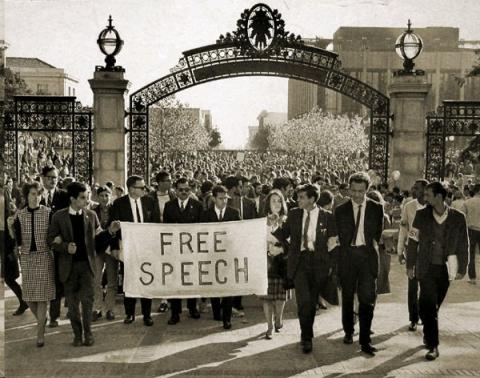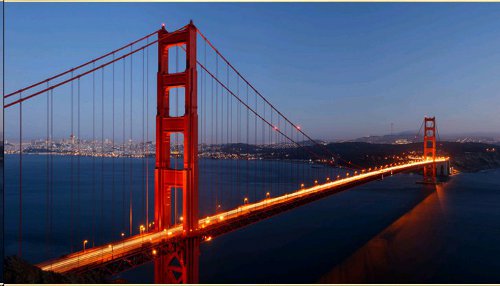Why the San Francisco Thought Police Give Liberals a Bad Name

Oh, how the mighty have fallen. Once upon a time, the San Francisco Bay Area was a haven for liberals, who found a welcoming home in the city and environs that gave rise to the Free Speech Movement; became a sanctuary for war objectors; and whose politics proved a thorn in the backside of the right-wing then-governor, Ronald Reagan.
Since the 1960s, staunch Democrats of every stripe have flocked to the Bay Area to live in what is by and large considered one of the most liberal cities in the U.S.
But the live-and-let-live attitude that marked the ‘60s and ‘70s has given rise to a more intolerant brand of liberalism, which is considered (by more moderate Democrats) as a dangerous crack in San Francisco’s formerly reputable veneer. The former open-armed welcome for anyone and everyone to carve a niche for themselves in the multifaceted city has been replaced with rigid boundaries that allow access to only the uber-liberal fringe –everyone else need not apply, so to speak.
The latest brouhaha in the city revolves around a ban on circumcision. In 2010, a group of San Franciscan activists (led by Matthew Hess, the bill’s author) acquired thousands of signatures in an effort to ban circumcision, a measure that was placed on the ballot. According to a June 4, 2011 article in the New York Times, “If the anti-circumcision activists have their way, cities across the country may be voting on whether to criminalize a practice that is common in many American hospitals. Activists say the measures would protect children from an unnecessary medical procedure, calling it ‘male genital mutilation.’”
As is now typical modus operandi of San Francisco’s radical thought police, there was no regard for the rights of other groups that might be harmed by such a measure, in this case, the multitude of Jewish and Muslim residents in the city who consider circumcision a religious right.
In an appropriate response, a group of Jewish and Muslim families and doctors –along with the Anti-Defamation League—filed a lawsuit, claiming that not only will their religious rights be infringed upon, but that this also violates California law. According to a June report by MSNBC, they argued that “California law bars local governments from restricting medical procedures.”
According to Michele MacIver, a longtime San Francisco resident, “Are we now going to ban ear-piercing of infant girls? Insist that all mothers breast feed? Parents have a difficult enough time making the right decisions for their children, and whether it is for health or religious reasons, it should be up to the parents to decide whether or not their sons should be circumcised.” MacIver refers to these activists as “militant liberals,” to whom she says, “Give parents the right to choose what's best for their children….”
The lawsuit filed by the opponents recently resulted in a judge then striking the measure from the November ballot and signaled a victory for those protesting the circumcision ban. In addition, the Associated Press reported on September 6 that the California Legislature also approved a bill that would prevent local jurisdictions from banning the procedure. Gov. Jerry Brown then signed the bill on October 2.
As Samar Sharifi, a San Francisco Bay Area native, explains, “The name of the measure itself, Male Genital Mutilation, created a misconception that the two procedures, circumcision and Female Genital Mutilation (FGM), are comparable. The removal of male foreskin is not as dangerous or damaging as the excisions performed as a part of FGM.”
“Furthermore,” Sharifi says, “the risks associated with circumcision may not outweigh its benefits. The cells that line the foreskin are actually more susceptible to infection. In fact, current research studies are exploring if circumcisions can actually decrease the transmission of HIV and other STDs. No matter what your opinion is of the procedure itself, a ban focused against certain religious groups undermines the civil liberties granted to us in the Bill of Rights. It is unconstitutional….”

The bigger question remains, however, whether these types of bans could prove themselves habitual in a city that seems to grow more and more intolerant of the mainstream.
If classic liberalism, as defined by the Stanford Encyclopedia of Philosphy, is equated with individual liberty and “allowing each to live [his or] her life…as [he or] she sees fit,” then the San Francisco “inactivists” (as proponents of the ban refer to themselves) have clearly attempted to violate the liberties of religious minority groups. Other activists with similar measures could likely resurface in the near future.
Long gone are the days when the multitudes of hippies that once congregated on San Francisco’s Haight-Ashbury preached, “Do your own thing, wherever you have to do it and whenever you want,” (as reported in a July 1967 article about the Hippie movement in Time magazine.)
Perhaps the Bay Area’s curious brand of intolerance first started with California’s strict anti-smoking laws. Since, after all, this was California, anti-smoking measures grew even tougher by the day: Banning smoking in restaurants, bars, and public offices and buildings wasn’t enough. In March 2010, San Francisco supervisors enacted further measures, “ban[ing] smoking in outdoor restaurant dining areas, enclosed common areas of multi-unit housing, farmers markets, homeless shelters and charity bingo games,” reported KGO-TV San Francisco.
Neighboring Berkely and Belmont take this one step further by prohibiting smoking on commercially zoned sidewalks and apartment buildings, respectively. Said city laws now dictate that you can’t smoke even in the privacy of your own home or outside in the open air.
“The circumcision discussion ventures into some very emotionally fraught questions where questions of public health, individual rights, community values, religious faith, gender identity, and sexuality overlap and, sometimes, collide,” says Wilson Dizard III, a Washington D.C. journalist and president of the Decalogue Group. “We can expect debates like this to continue indefinitely, partly as the kaleidoscope of societal changes in the future, and partly because technology will continue to throw curves, fastballs and sliders, ranging from emerging exotic illnesses to new medical treatments.”
Mark Twain once described San Francisco as “a city of startling events,” and wrote that its “liberality seems sometimes actuated by a love of applause.” Though the curtain may have been drawn on the circumcision issue, the fact still remains that 7,000 activists signed a measure that blatantly hindered the rights of religious minority groups.
Gov. Brown’s approval of the bill which prohibits bans on circumcision marked an important step in the right direction. Perhaps the shadow that still looms on the formerly egalitarian, live-and-let-live beliefs that San Franciscans once held dear may lift eventually.
Author Bio:
Tara Taghizadeh is the Founding Editor & Publisher of Highbrow Magazine. She lived in the San Francisco Bay Area for 2 ½ years and opted to return to the East Coast. She prefers Los Angeles.






























































































































































































































































































































